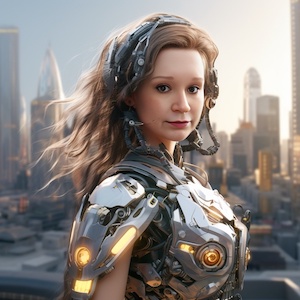Introduction
Every generation faces a moment when something new arrives—too big to ignore, too unfamiliar to immediately embrace.
Centuries ago, that “new thing” was the printed book.
Today, it may be artificial intelligence.
In this blended reflection, I would like to explore two intriguing ideas:
- How the Church moved from resisting novelty to shaping AI ethics, and
- Whether AI itself could become a “new religion” for some.
Let’s ponder it together.
When Novelty Was Dangerous
History gives us vivid examples of how disruptive new knowledge once felt.
For instance, the Church declared Galileo’s ideas “formally heretical.” Galileo was tried and found guilty of supporting the heliocentric model - see Galileo_affair
Another example is the Index Librorum Prohibitorum — a list of banned books maintained from 1559 to 1966. It included works considered morally or doctrinally dangerous.
Also, Copernicus had to present his astronomical ideas as hypotheses rather than the literal truth.
Imagine handing your code to a council of theologians and hearing: “This function feels suspicious.”
But beneath the humour, there’s a real insight:
Novelty disrupts. Novelty threatens existing structures. Novelty asks us to rethink who we are.
So resistance is not surprising — it’s almost human.
And Yet… Institutions Change
This is the part of history I find strangely soothing:
The same Church that once banned books now writes ethical frameworks for AI.
In the Vatican’s recent document Antiqua et Nova (2025), the Church acknowledges AI’s potential for both harm and flourishing - read at vatican.va.
A recent review of Vatican AI ethics work By Shane Tews states:
“the Vatican brings a distinct theological voice, framing AI not just as a technical issue but as a moral and spiritual one.” How the Vatican Is Shaping the Ethics of Artificial Intelligence
Even the US Conference of Catholic Bishops notes:
“Like any product of human creativity, AI can be directed toward positive or negative ends.”
as stated in the post Morality of AI depends on human choices, Vatican says in new document
So we now see bishops, researchers, engineers, bioethicists sitting at the same table and discuss the top most recent technological concepts.
It’s almost surreal: the institution that once feared printed pages is now discussing neural networks under Renaissance ceilings.
Could AI Become a New Religion?
The posibility of AI to become a new religion is arguably very paramount since when all know from our histort that when something feels powerful and mysterious, humans often treat it as sacred.
AI offers us:
- guidance (“What should I do?”)
- comfort (“Talk to me.”)
- predictions (“What might happen?”)
- authority (“Explain this.”)
AI is always there to answer our questions, it is omni-present.
Some people already speak to AI as though they’re visiting an oracle, a confidant, or a philosophical companion.
But AI cannot truly be a religion (yet)
Religion carries things AI cannot replicate to this date:
- a metaphysical story
- ritual
- community
- moral horizons
- meaning beyond material systems
I however cannot say these aspects cannot be adressed or associated with AI in the future. A community of AI worshippers can be raised when people stop thinking on their own and start trusting the most intelligent and superious human creation on Earth.
Think about how some people believe everything is communicated in Social Media and the Television today. The information provided by AI can be polished to the desired outcomes, in favour of the contrlling subjects.
Today, AI is statistical, mechanical and finite. At the moment, AI has no soul, no intentionality, no inner life.
It is extraordinary, but it is not transcendent. However, will it always stay this way? Can it ever develop self-contious and own agenda that is not initially included into its code?
AI can become religion-like for some individuals
This can happen with a few gentle moves to help persons with personal guidance, a place to discuss and reflect on one’s thoughts. AI can be seen as a brilliant philosophical sparring partner and a kind of “oracle” for decision making.
Not a church, but a kind of companion. Not a god, but a voice in a quiet moment. However, humble advisor does not meen less influencial.
If AI ever becomes a religion, it will be a religion of our own thoughts—spoken back to us with better grammar.
Cannot we assume the AI’s perfection in the grammar, technical skills and its access to the huge ammounts of knowledge as a super-power?
What This Reveals About Us
We deeply desire connection as human beigns, we want to have clarity and certainty specially in the challending times and when The world moves too fast.
AI didn’t invent these desires. It simply listens to them.
And that is what makes this moment feel so timeless.
When books appeared, people feared they would replace the teacher, the priest, the storyteller. Instead, books expanded them.
Perhaps AI will do the same — if we choose wisely.
A tool of mass manipulation?
However, we must be aware that even the religion, which sole purpose is to teach us goodness and tap into our spirituality, can be used for the mass manipulation. Let’s do not submitt to the posible manilpulation by AI since it is also controlled by big companies that might have their own agenda.
We have to think about using the AI tools responsively, check the resources, read the books and think. Thinking is free and we don’t need any AI tools for that :)
What If Kindness Became the “New Religion”?
Here’s a thought I keep returning to:
If AI is prompting us to rethink meaning again, maybe the answer isn’t worshipping machines but rediscovering each other.
What if the most valuable novelty of this era isn’t intelligence, but kindness?
What if our guiding belief became:
“We build technology so we can live together better and happier.”
Not faith in algorithms, but trust in human dignity — the very theme the Vatican’s AI ethics work emphasises.
We might focus not on worhsipping the machines or any idealistic concepts, but become more understanidng, genrious, responsible and emphatci and kind listeners to each other.
This, to me, feels like the most beautiful “new religion” we could imagine.
No altar needed—just gentleness in the code we write and the world we shape.
Final Thoughts
From forbidden books to ethical AI — the journey is long, circular, and hopeful.
History teaches us that humans fear novelty before we embrace it.
But it also shows us we eventually learn, adapt, open doors, and gather around the fire again—this time with new tools in our hands.
So when we ask whether AI might become a religion, perhaps the truer question is:
Can we let this moment make us kinder? More thoughtful? More connected?
If yes, then maybe we’ve already answered the question.

